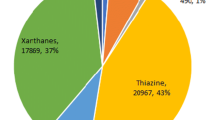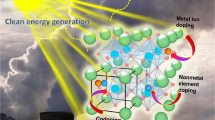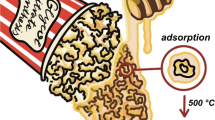Abstract
Nanostructure single ZnO, SnO2, In2O3 and composite ZnO/SnO2, ZnO/In2O3 and ZnO/SnO2/In2O3 films were prepared using sol–gel method. The obtained composite films were characterized with X-ray diffraction (XRD), scanning electron microscopy (SEM), and UV–Vis spectroscopy. The photocatalytic activities of composite films were investigated using phenol (P), 2,4-dichlorophenol (2,4-DCP), 4-chlorophenol (4-CP) and 4-aminophenol (4-AP) as a model organic compounds under UV light irradiation. Hybrid semiconductor thin films showed a higher photocatalytic activity than single component ZnO, SnO2 and In2O3 films. The substituted phenols degrade faster than phenol. The ease of degradation of phenols is different for each catalyst and the order of catalytic efficiency is also different for each phenol. The use of multiple components offered a higher control of their properties by varying the composition of the materials and related parameters such as morphology and interface. It was also found that the photocatalytic degradation of phenolic compounds on the composite films and single films followed pseudo-first order kinetics.






Similar content being viewed by others
References
Schiavello M (1988) Photocatalysis and environment. Kluwer, Dordrecht
Ollis DF, Al-Ekabi H (1993) Photocatalytic purification and treatment of water and air. Elsevier, Amsterdam
Fox MA, Dulay MT (1993) Heterogeneous photocatalysis. Chem Rev 93:341–357
Pichat P (2003) In: Tarr MA (ed) Chemical degradation for wastes and pollutants: environmental and industrial applications. Marcel Dekker, New York, pp 77–119
Hoffmann MR, Martin ST, Choi W, Bahnemann DW (1995) Environmental applications of semiconductor photocatalysis. Chem Rev 95:69–96
Fujishima A, Hashimoto K, Watanabe T (1999) TiO2 photocatalysis. BKC, Tokyo
King MB (1969) Phase equilibrium in mixtures. Pergamon Press, New York
Greminger DC, Burns GP, Lynn S, Hanson DN, King CJ (1982) Ind Eng Chem Process Des Dev 21:51–54
Dabrowski A, Podkoscielny P, Hubicki Z, Barczak M (2005) Adsorption of phenolic compounds by activated carbon—a critical review. Chemosphere 58:1049–1070
Hoshi M, Kogure M, Saitoh T, Nakagawa T (1997) Separation of aqueous phenol through polyurethane membranes by pervaporation. J Appl Polym Sci 65:469–479
Bhargava SK, Tardio J, Prasad J, Folger K, Akolekar DB, Grocott SC (2006) Wet oxidation and catalytic wet oxidation. Ind Eng Chem Res 45:1221–1258
Panizza M, Cerisola G (2001) Removal of organic pollutants from industrial wastewater by electrogenerated Fenton’s reagent. Water Res 35:3987–3992
Colon G, Sanchez-España JM, Hidalgo MC, Navìo JA (2006) Effect of TiO2 acidic pre-treatment on the photocatalytic properties for phenol degradation. J Photochem Photobiol, A: Chem 179:20–27
Long Jiang HE, Hwatay J, Maszenan AM, Lee Tay ST (2006) Enhanced phenol biodegradation and aerobic granulation by two co aggregating bacterial strains. Environ Sc Technol 40:6137–6142
Buikema AL Jr, McGinniss MJ, Caims J Jr (1979) Phenolics in aquatic ecosystems: a selected review of recent literature. Mar Environ Res 2:87–181
American Conference of Governmental Industrial Hygienists Standards (ACGIH) Manual (2005) and United States Environmental Protection Agency, EPA, 816-F-01-007, 2006
Patil SS, Shinde VM (1988) Biodegradation studies of aniline and nitrobenzene in aniline plant wastewater by gas chromatography. Environ Sci Technol 22:1160–1165
Moore AT, Vira A, Fogel S (1989) Biodegradation of trans-1,2-dichloroethylene by methane-utilizing bacteria in an aquifer simulator. Environ Sci Technol 23:403–406
Lin SH, Lin CM (1993) Treatment of textile waste effluents by ozonation and chemical coagulation. Water Res 27:1743–1748
Meshko V, Markovska L, Mincheva M, Rodrigues AE (2001) Adsorption of basic dyes on granular activated carbon and natural zeolite. Water Res 35:3357–3366
Arami M, Limaee NY, Mahmoodi NM, Tabrizi NS (2005) Occurrence and production of chloramines in the chlorination of creatinine in aqueous solution. J Colloid Interf Sci 288:371–379
Galindo C, Jacques P, Kalt A (2001) Photooxidation of the phenylazonaphthol AO20 on TiO2: kinetic and mechanistic investigations. Chemosphere 45:997–1005
Sakthivel S, Neppolian B, Shankar MV, Arabindoo B, Palanichamy M, Murugesan V (2003) Solar photocatalytic degradation of azo dye: comparison of photocatalytic efficiency of ZnO and TiO2. Sol Energy Mater Sol Cells 77:65–82
Jang YJ, Simer C, Ohm T (2006) Comparison of zinc oxide nanoparticles and its nano-crystalline particles on the photocatalytic degradation of methylene blue. Mater Res Bull 41:67–77
Gouvea K, Wypych F, Moraes SG, Duran N, Nagata N, Peralta-Zamora P (2000) Semiconductor-assisted photocatalytic degradation of reactive dyes in aqueous solution. Chemosphere 40:433–440
Dindar S, Icli J (2001) Unusual photoreactivity of zinc oxide irradiated by concentrated sunlight. Photochem Photobiol A Chem 140:263–268
Lizama C, Freer J, Baeza J, Mansilla HD (2002) Optimized photodegradation of Reactive Blue 19 on TiO2 and ZnO suspensions. Catal Today 76:235–246
Wang J, Jiang Z, Zhang L, Kang P, Xie Y, Lv Y, Xu R, Zhang X (2009) Onocatalytic degradation of some dyestuffs and comparison of catalytic activities of nano-sized TiO2, nano-sized ZnO and composite TiO2/ZnO powders under ultrasonic irradiation. Ultrason Sonochem 16:225–231
Chakrabarti S, Dutta BK (2004) Photocatalytic degradation of model textile dyes in wastewater using ZnO as semiconductor catalyst. J Hazard Mater B 112:269–278
Yatmaz HC, Akyol A, Bayramoglu M (2004) Kinetics of the photocatalytic decolorization of an Azo reactive dye in aqueous ZnO suspensions. Ind Eng Chem Res 43:6035–6039
Wang Y, Li X, Lu G, Chen G, Chen Y (2008) Synthesis and photo-catalytic degradation property of nanostructured-ZnO with different morphology. Mater Lett 62:2359–2362
Wang H, Xie C, Zhang W, Cai S, Yang Z, Gui Y (2007) Comparison of dye degradation efficiency using ZnO powders with various size scales. J Hazard Mater 141:645–652
Xu L et al (2009) ZnO with different morphologies synthesized by solvothermal methods for enhanced photocatalytic activity. Chem Mater 21:2875–2879
Wang Y, Li X, Wang N, Quan X, Chen Y (2008) Controllable synthesis of ZnO nanoflowers and their morphology-dependent photocatalytic activities. Sep Purif Techno 62:729–734
Chakrabarti S, Chaudhuri B, Bhattacharjee S, Das P, Dutta BK (2008) Degradation mechanism and kinetic model for photocatalytic oxidation of PVC–ZnO composite film in presence of a sensitizing dye and UV radiation. J Hazard Mater 154:230–236
Pal B, Sharon M (2002) Enhanced photocatalytic activity of highly porous ZnO thin films prepared by sol–gel process. Mater Chem Phys 76:82–87
Jakob M, Levanon H, Kamat PV (2003) Charge distribution between UV-Irradiated TiO2 and gold nanoparticles: determination of shift in the fermi level. Nano Lett 3:353–358
Sasaki T et al (2004) Photoelectrochemical behavior of the Pt/TiO2 nanocomposite electrodes prepared by co-sputter deposition. Electrochemistry 72:443–449
Arabatzis IM, Stergiopoulos T, Bernard MC, Labou D, Neophytides SG, Falaras P (2003) Silver-modified titanium dioxide thin films for efficient photodegradation of methyl orange. Appl Catal B Environ 42:187–201
Choi WY, Termin A, Hoffmann MR (1994) The role of metal ion dopants in quantum-sized TiO2: correlation between photoreactivity and charge carrier recombination dynamics. J Phys Chem 98:13669–13679
Hoffmann MR, Martin ST, Choi WY, Bahnemann DW (1995) Environmental applications of semiconductor photocatalysis. Chem Rev 95:69–96
Bhargava RN, Gallagher D, Welker T (1994) Doped nanocrystals of semiconductors—a new class of luminescent materials. J Lumin 60–61:275–280
Kumara G et al (2003) Efficient dye-sensitized photoelectrochemical cells made from nanocrystalline tin(IV) oxide–zinc oxide composite films. Semicond Sci Technol 18:312–318
Van LH, Hong MH, Ding J (2006) Pulsed laser deposition and fabrication of CoO/ZnO and CoO/TiO2 nano-hybrid thin film. Solid State Phenom 111:131–134
Skorb EV, Antonouskaya LI, Belyasova NA, Shchukin DG, Möhwald H, Sviridov DV (2008) Antibacterial activity of thin-film photocatalysts based on metal-modified TiO2 and TiO2:In2O3 nanocomposite. Appl Catal B Environ 84:94–99
Chou CH, Wang HS, Wei KH, Huang JY (2006) Thiophenol-modified CdS nanoparticles enhance the luminescence of benzoxyl dendron-substituted polyfluorene copolymers. Adv Funct Mater 16:909–916
van Beek R et al (2006) Side chain mediated electronic contact between a tetrahydro-4H-thiopyran-4-ylidene-appended polythiophene and Cd/Te quantum dots. Chem Eur J 12:8075–8083
Hammer NI, Emrick T, Barnes MD (2007) Quantum dots coordinated with conjugated organic ligands: new nanomaterials with novel photophysics. Nanoscale Res Lett 2:282–290
Hotchandani S, Kamat PV (1992) Charge-transfer processes in coupled semiconductor systems. Photochemistry and photoelectrochemistry of the colloidal cadmium sulfide-zinc oxide system. J Phys Chem 96:6834–6839
Vaezi MR (2008) Two-step solochemical synthesis of ZnO/TiO2 nano-composite materials. J Mater Process Technol 205:332–337
Jung MN et al (2009) Field emission properties of indium-doped ZnO tetrapods. Curr Appl Phys 9:e169–e172
Peng LP et al (2009) Effect of annealing temperature on the structure and optical properties of In-doped ZnO thin films. J Alloys Comp 484:575–579
Hu J, Gordon RG (1992) Atmospheric pressure chemical vapor deposition of gallium doped zinc oxide thin films from diethyl zinc, water, and triethyl gallium. J Appl Phys 72:5381–5392
Gómez H, Maldonado A, Asomoza R, Zironi EP, Cańetas-Ortega J, Palacios-Gómez J (1997) Characterization of indium-doped zinc oxide films deposited by pyrolytic spray with different indium compounds as dopants. Thin Solid Films 293:117–123
Bougrine A, El Hichou A, Addou M, Ebothé J, Kachouane A, Troyon M (2003) Structural, optical and cathodoluminescence characteristics of undoped and tin-doped ZnO thin films prepared by spray pyrolysis. Mater Chem Phys 80:438–445
Gulino A, Fragala I (2002) Deposition and characterization of transparent thin films of zinc oxide doped with Bi and Sb. Chem Mater 14:116–121
Oua H–H, Loa S-L, Wu C-H (2006) Exploring the interparticle electron transfer process in the photocatalytic oxidation of 4-chlorophenol. J Hazard Mater B137:1362–1370
Wang C et al (2004) Enhanced photocatalytic performance of nano sized coupled ZnO/SnO2 photocatalysts for methyl orange degradation. J Photochem Photobiol, A: Chem 168:47–52
Zhang M, An T, Hu X, Wang C, Sheng G, Fu J (2004) Preparation and photocatalytic properties of a nanometer ZnO–SnO2 coupled oxide. Appl Catal A General 260:215–222
Cun W et al (2002) Preparation, characterization and photocatalytic activity of nano-sized ZnO/SnO2 coupled photocatalysts. Appl Catal B: Environ 39:269–279
Liu G, Li G, Qiu X, Li L (2009) Synthesis of ZnO/titanate nanocomposites with highly photocatalytic activity under visible light irradiation. J Alloys Compd 481:492–497
Wang X-T, Zhong S-H, Xiao X-F (2005) Photo-catalysis of ethane and carbon dioxide to produce hydrocarbon oxygenates over ZnO-TiO2/SiO2 catalyst. J Mol Catal A: Chem 22:87–93
Shouqiang W, Zhongcai S, Xudong L, Ying L, Linlin C, Yan H (2009) Photocatalytic degradation of methyl orange over ITO/CdS/ZnO interface composite films. J Environ Sci 21:991–996
Suárez-Parraa R, Hernández-Pérez I, Rincón ME, López-Ayalaa S, Roldán-Ahumada MC (2003) Visible light-induced degradation of blue textile azo dye on TiO2/CdO–ZnO coupled nanoporous films. Sol Energy Mater Sol Cells 76:189–199
Zhang Z, Yuan Y, Fang Y, Liang L, Ding H, Jin L (2007) Preparation of photocatalytic nano-ZnO/TiO2 film and application for determination of chemical oxygen demand. Talanta 73:523–528
Tian J et al (2009) Photocatalyst of TiO2/ZnO nano composite film: preparation, characterization, and photodegradation activity of methyl orange. Surf Coat Technol 204:205–214
Jiang HB, Gao L, Zhang QH (2003) Preparation and properties of Fe2O3/TiO2 and ZnO/TiO2 nanosized particulate thin films. J Inorg Mater 18:695–699
Khodja AA, Sehili T, Pilichowski J-F, Boule P (2001) Photocatalytic degradation of 2-phenylphenol on TiO2 and ZnO in aqueous suspensions. J Photochem Photobiol A Chem 141:231–239
Sobana N, Muruganandam M, Swaminathan M (2008) Characterization of AC-ZnO catalyst and its photocatalytic activity on 4-acetylphenol degradation. Catal Commun 9:262–268
Salah NH, Bouhelassa M, Bekkouche S, Boultif A (2004) Study of photocatalytic degradation of phenol. Desalination 166:347–354
Lee HS, Lee JY, Kim TW, Kim DW, Cho WJ (2004) Formation mechanism of preferential c-axis oriented ZnO thin films grown on p-Si substrates. J Mater Sci 39:3525–3528
Shannon RD (1976) Revised effective ionic radii and systematic studies of interatomic distances in halides and chalcogenides. Acta Crystallogr A32:751–767
Ghosh R, Basak D, Fujihara S (2004) Effect of substrate-induced strain on the structural, electrical, and optical properties of polycrystalline ZnO thin films. J Appl Phys 96:2689–2692
Zhang Y, Lin B, Fu Z, Liu C, Han W (2006) Strong ultraviolet emission and rectifying behavior of nanocrystalline ZnO films. Opt Mater 28:1192–1196
Ashour A, Kaid MA, El-Sayed NZ, Ibrahim AA (2006) Physical properties of ZnO thin films deposited by spray pyrolysis technique. Appl Surf Sci 252:7844–7848
Xu Y, Schoonen MAA (2000) The absolute energy positions of conduction and valence bands of selected semiconducting minerals. Am Mineral 85:543–556
Testino A et al (2007) Optimizing the photocatalytic properties of hydrothermal TiO2 by the control of phase composition and particle morphology. A systematic approach. J Am Chem Soc 129:3564–3575
Tachikawa T, Fujitsuka M, Majima T (2007) Mechanistic insight into the TiO2 photocatalytic reactions: design of new photocatalysts. J Phys Chem C 111:5259–5275
Zhao J, Li B, Onda K, Feng M, Petek H (2006) Solvated electron on metal oxide surfaces. Chem Rev 106:4402–4427
Hagfeldt A, Gratzel M (1995) Light-induced redox reactions in nanocrystalline systems. Chem Rev 95:49–68
Li GR, Hu T, Pan GL, Yan TY, Gao XP, Zhu HY (2008) Morphology—function relationship of ZnO: polar planes, oxygen vacancies, and activity. J Phys Chem C 112:11859–11864
Zhang J, Sasaki K, Sutter E, Adzic RR (2007) Stabilization of platinum oxygen-reduction electrocatalysts using gold clusters. Science 315:220–222
Ahmed S, Rasul MG, Wayde N, Martens R, Brown MA, Hashib S (2010) Heterogeneous photocatalytic degradation of phenols in wastewater: a review on current status and developments. Desalination 261: 3–18 and the references cited in there
Brezova V, Ceppan M, Breza M, Brandsteterova E, Lapcik L (1991) Photocatalytic hydroxylation of benzoic acid in aqueous titanium dioxide suspension. J Photochem Photobiol A 59:385–391
Eberhardt MK, Yoshida M (1973) Radiation-induced homolytic aromatic substitution. I. Hydroxylation of nitrobenzene, chlorobenzene, and toluene. J Phys Chem 77:589–597
Poulios I, Kositzi M, Kouras A (1998) Photocatalytic decomposition of triclopyr over aqueous semiconductor suspensions, Photocatalytic decomposition of triclopyr over aqueous semiconductor suspensions. J Photochem Photobiol A Chem 115:175–183
Richard C, Bengana S (1996) pH effect in the photocatalytic transformation of a phenyl-urea herbicide. Chemosphere 33:635–641
Zhang F, Zhao J, Shen T, Hidaka H, Pelizzetti E, Serpone N (1998) TiO2—assisted photodegradation of dye pollutants II. Adsorption and degradation kinetics of eosin in TiO2 dispersions under visible light irradiation. Appl Catal B Environ 15:147–156
Acknowledgments
The authors are grateful for the financial support provided by Islamic Azad University, Shahreza branch.
Author information
Authors and Affiliations
Corresponding author
Rights and permissions
About this article
Cite this article
Talebian, N., Nilforoushan, M.R. & Ramazan Ghasem, R. Enhanced photocatalytic activities of ZnO thin films: a comparative study of hybrid semiconductor nanomaterials. J Sol-Gel Sci Technol 64, 36–46 (2012). https://doi.org/10.1007/s10971-012-2825-4
Received:
Accepted:
Published:
Issue Date:
DOI: https://doi.org/10.1007/s10971-012-2825-4




